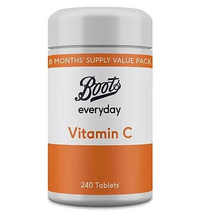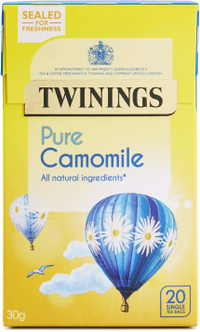14 of the best natural hay fever remedies for all the family - from toddlers to teens
We've asked the experts for their advice on the best natural hay fever remedies
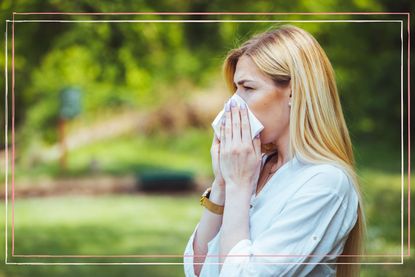

Natural hay fever remedies can be an alternative to over-the-counter options in the spring and summer, as the weather gets warmer and the pollen count grows.
While many people seek out over-the-counter medications for seasonal allergies, hay fever is equally as easy to treat with natural remedies. With more of us experiencing classic hay fever symptoms than ever before - as climate change leads to the pollen season lasting longer and longer - it's important to have go-tos in your back pocket.
"As the climate changes, so does the make-up of plant pollens." Pharmacist Stuart Gale from Oxford Online Pharmacy explains, "Although you were previously exposed to pollens throughout your life which did not affect you, you may suddenly find you're sensitive to a particular pollen strain. Pollen counts are on the increase, combined with warmer summers. This exacerbates the impact of pollution on the body."
So, if you want to save on hay fever tablets, then check out this list of expert-approved natural hay fever remedies - with something suitable for all ages.
14 of the best natural hay fever remedies
Naturopath Ben Brown, expert advisor to the Health Food Manufacturers Association (HFMA), explains that there's no need to turn to medications for hay fever relief, as "there are several vitamins and minerals found in foods that can help to manage hay fever symptoms for sufferers."
He explains, "Hay fever, or allergic rhinitis, is a common allergic reaction to pollen and spores and can cause rapid onset or irritating and uncomfortable symptoms, including itchy, watering eyes, stuffy nose, sneezing and headaches."
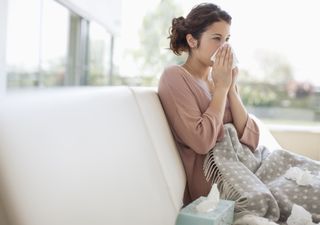
Though hay fever can be unpleasant, there are also plenty of unwanted side effects associated with over-the-counter hay fever medications - such as drowsiness - which can affect your focus and make you feel tired all the time.
GoodtoKnow Newsletter
Parenting advice, hot topics, best buys and family finance tips delivered straight to your inbox.
Meanwhile, eye drops can cause eyes to sting, and nasal decongestants can lead to an itchy rash around the nose. There's also a debate over hay fever medication during pregnancy, and while babies can get hay fever not all antihistamines are safe for young children.
Natural hay fever remedies for babies
1. Keep pollen out of your home
Many natural hay fever remedies aren't suitable for very young babies, so the best thing to do is prevent symptoms by stopping pollen from getting into your home. While it might be tempting to have the windows open on a warm spring day, you’re simply inviting irritants inside - so keeping your doors and windows completely closed will help to prevent pollen getting in.
Make your bedroom an anti-pollen zone by ensuring the windows are kept always shut, and washing bedding regularly will also help. Make sure to not wear clothes you’ve worn outside in the bedroom, as this will simply transfer pollen and other allergens to your sheets.
2. Invest in an air purifier
Air purifiers remove dust and other particles from the air - therefore removing the triggers of your allergies - so sleeping with an air-purifying device can massively reduce hay fever symptoms during the night or nap times.
Meanwhile, a cool mist humidifier can also help relieve symptoms. Adding moisture into the air by emitting water vapour, humidifiers can help clear your airways and make it easier to breathe. Keeping these passages moisturised will prevent congestion and dryness.
Natural hay fever remedies for children
3. Honey
Honey is said to be a natural remedy for hay fever because the bee pollen in it can desensitise your body to other pollens, and studies have shown that ingesting honey reduces symptoms of inflammation in the nose caused by allergic rhinitis.
Increasing honey in your daily dietary intake should reduce hay fever symptoms significantly - though make sure you use local honey to your area to see the best results - and the great thing about this natural hay fever remedy is that it tastes good too!
When to take: Daily before hay fever season starts.
4. Vitamin C
Vitamin C is a known natural antihistamine and can be found in oranges, lemons and grapefruit. Also present are bioflavonoids, which have powerful anti-allergy effects. The combination of vitamin C and bioflavonoids together provide a natural decongestant and antihistamine for sufferers and help alleviate symptoms.
"Vitamin C acts as a natural antihistamine," says Nutritional Therapist Alison Cullen from natural remedies manufacturer A.Vogel. "Your body can’t make or store vitamin C, so it has to be available in low, consistent doses to support your nasal lining."
Oranges make for a natural hay fever remedy that is convenient, tasty and cheap because they're a good source of vitamin C, or you could take a supplement.
What to take: 1,000mg of vitamin C a day.
Boots Vitamin C Food Supplement - 30 Tablets | 99p
30 vitamin C tablets free from artificial colours, flavours and preservatives. Suitable for adults and children aged 12 and over.
5. Carotenoids
Naturally occurring pigments in plants, carotenoids act as powerful antioxidants to help reduce inflammation in your airways and boost your immune system. A good source of carotenoids can be found in foods such as carrots, apricots, pumpkin, sweet potato and spinach - natural remedies for hay fever can actually be pretty tasty!
When to take: One to two servings of carotenoid-rich food per day.
6. Vaseline
Hay fever sufferers praise Vaseline for being a vital hay fever remedy as soon as the weather begins to warm up. Spreading a thin layer of Vaseline inside the lower nostrils can help combat hay fever and reduce symptoms significantly, as the Vaseline traps pollen entering the nostrils. It's effectively blocking the pollen from entering the nasal passages and stops hay fever symptoms from worsening.
This is another natural hay fever remedy that you probably already own - and if you don't, you can pick up a tub from your local supermarket for less than £3.
When to take: Daily during hay fever season, before leaving the house.
Natural remedies for adults and teens
7. Onions
Onion skins are a good source of quercetin, a natural antihistamine and anti-inflammatory proven to reduce symptoms in hay fever sufferers. Onions contain three times as much quercetin as kale and 10 times as much as broccoli, and can be eaten throughout the day in a variety of meals, so they're one of the easier hay fever remedies to try.
When to take: Daily with meals - although you could try chewing raw onions as an alternative. We only recommend this if you're staying in!
8. Hot peppers
Red and chilli peppers contain an active component called capsaicin, and one study found that capsaicin nasal spray can relieve nasal symptoms. When eaten, capsaicin opens the nasal passages, helping to reduce congestion.
Another convenient natural hay fever remedy, you can buy chilli peppers from your local supermarket or grocery store and use them in meals to help relieve hay fever symptoms.
What to take: Add red and chilli peppers to your daily diet, on salads or cooked with your evening meal.
9. Chamomile tea
An antioxidant and antihistamine, chamomile tea contains flavonoids that act as an anti-inflammatory agent. While best taken as a cuppa during the day, chamomile tea can also be used as an eye compress to cool swollen, red eyes.
Once again, chamomile tea can easily be found in your local supermarket, and often a box of teabags costs less than £2.
Twinings Pure Camomile 20 Tea Bags, 30g - £1.80 | Amazon
Naturally caffeine free with no added sugars, this tea blend is made from the pollen heads of camomile flowers. Infuse for 2-3 minutes for the perfect cup, or leave for a little longer if you like a stronger taste.
What to take: Daily as a cuppa or as an eye compress. Make sure to use a fresh compress for each eye to avoid infection.
Making and using a compress:
- Submerge an instant chamomile teabag in water. Leave it there for at least 3 mins.
- Dump out the water and gently squeeze the excess water from the teabag.
- Refrigerate the chamomile tea bag for 15 to 30 mins and remove from the fridge once cool.
- Hold the cool tea bag against the swollen eye for up to 5 mins at a time.
- Allow your inflamed eye to breathe for an hour before attempting to re-apply a new compress.
10. Garlic
Increasing your dietary intake of garlic can help boost your body's immune system, while also acting as a decongestant and helping to alleviate minor hay fever symptoms. It's also an anti-inflammatory and a good source of quercetin, a natural antihistamine.
And the great thing about this natural hay fever remedy is that you probably already have it in your cupboard!
When to take: With meals, one or two months before the hay fever season starts, but most effective when eaten crushed or raw. If you can't stomach that, try garlic capsules from your local pharmacy.
Natural remedies for hay fever during pregnancy
11. Acupuncture
Research has found that the ancient Chinese medicine of acupuncture can be a natural hay fever remedy, helping to reduce hay fever symptoms, such as a runny nose and itchy eyes. Using sterile needles, acupuncture pinpoints specific areas of the body and helps relieve any symptoms caused by current ailments.
You can find an acupuncturist near you on the British Acupuncture Council website.
When to try: Sufferers should have four to six acupuncture sessions before hay fever season starts to see the best results.
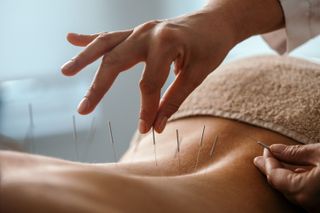
12. Self-hypnosis
One study has suggested that sufferers trained to use self-hypnosis could see a reduction in their hay fever symptoms, such as a runny nose and irritated throat.
Researchers at the University of Basel in Switzerland tested 66 hay fever sufferers over two years. While the effects of self-hypnosis were "not very strong", according to Andreas Bircher, who led the team, "it gives patients the possibility of intervening for themselves."
How to try self-hypnosis:
- Find a quiet and comfortable place to relax and begin to relax your body by tensing and then releasing each muscle group.
- Set your goal and visualise what you want to achieve.
- Focus your gaze - find something within your line of sight to focus on.
- Breathe slowly and deeply and imagine your eyelids are becoming heavier until they are too heavy to open.
- Continue to visualise, and create a calm and happy space in your mind.
- Move on to your goal once you feel completely calm, mentally repeating it to yourself.
- Allow yourself to slowly leave the hypnotic state, by moving your fingers and toes and feeling the surface beneath you.
13. Reflexology
Hay fever symptoms occur because when pollen enters the body, your immune system can think it's under attack and release the chemical histamine - the symptoms of which are just like a cold. It's thought that by applying pressure through reflexology, you can help reduce inflammation and therefore start to breathe more easily.
Not sure where to start? "Stimulating the Qu-chi acupuncture point on your elbow can improve the natural energy level so your body doesn’t react when it comes into contact with pollen." says Acupuncture expert Andrew Broch.
You can find a reflexologist near you on the Association of Reflexologists website.
14. Have a shower
While showering, washing your clothes and bedsheets won't help to prevent hayfever, it's one of the best way to sooth your symptoms. Pollen gets caught up in our hair and the fibres of our clothes when we leave the house - and especially when we spend time in the outdoors - so washing it all away can stop the sniffles in an instant.
This hay fever remedy is one to try at the end of the day if you're still struggling with symptoms after the sun has started to go down.
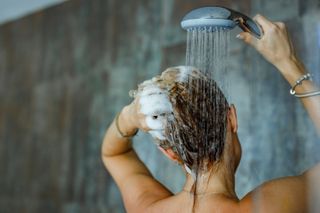
What should you avoid when you have hay fever?
- Dairy products - These can encourage the production of mucous, making symptoms like a blocked nose and a runny nose worse.
- Alcohol - Histamines, which the body releases during an allergic reaction, are also found in alcohol, so it could make your hay fever symptoms worse.
- Chocolate - Chocolate also contains histamines, and it has the double-whammy effect of being a dairy product too - steer clear!
- Caffeine - Histamines are also present in caffeine, so swap your usual cuppa for a herbal tea if you're suffering with hay fever.
- Nuts - Some nuts also contain histamines. While cashews and walnuts are some of the worst culprits, pecans, macadamia nuts and hazelnuts shouldn't worsen your symptoms.
What causes hay fever?
Hay fever is an allergic reaction to pollen - a fine powder from plants - and it is caused by the nose and/or eyes coming into contact with pollen.
This allergic reaction means the immune system launches an 'attack', resulting in the nasal passages become inflamed and more mucus is produced. Symptoms include: sneezing and coughing; a runny or blocked nose; itchy, red or watery eyes; itchy throat, mouth, nose and ears; headache; earache and feeling tired.
Unfortunately, there's currently no cure for hay fever and you cannot prevent it, but you can try these natural remedies to ease your symptoms.
Why is the pollen count getting higher?
A high pollen count often occurs during between May and June, because this is the time of year that grass pollinates. However, a high pollen count can also be caused by sunny weather and warm temperatures, and pollen counts are usually highest in the middle of the day.
The Met Office explains, "Tree pollen occurs first, typically from late March to mid-May, and affects around 25% of people. Most people are allergic to grass pollen (which actually has two peaks) and the season lasts from mid-May until July. Weed pollen can be released at any time but the season typically covers the end of June to September."
They add that climate change will have an affect on pollen patterns, because changes in temperature and rainfall may lengthen the pollen season and potentially make pollen concentrations higher, or even change the potency of pollen.
You can find out the pollen count in your local area via the Met Office's pollen count forecast.
Looking for more natural remedies? Try these cold remedies you can try at home, these tips to cure a cough, or check out or expert-approved natural flu remedies.
Video of the Week

Faye M Smith is a Senior Health And Lifestyle writer working across Woman & Home, Feel Good You, Woman’s Own and Woman magazine. Having gained an NCTJ postgraduate diploma, Faye has worked for 15 years in journalism, covering a range of lifestyle topics for companies including the BBC, Press Association, News UK and Hachette.
- Ellie HutchingsFamily News Editor
-
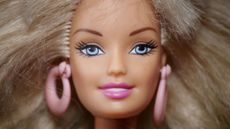 How to play with Barbie dolls: 6 ways to use the iconic doll as a positive role model at home
How to play with Barbie dolls: 6 ways to use the iconic doll as a positive role model at homeIf you have a little one who loves to play with Barbie, there are lots of positive ways in which you can encourage them to play in a way that helps their development and self-esteem. We’ll show you how.
By Joanne Lewsley Published
-
 Think you're raising a mini-me? It's actually unlikely your child will inherit your personality and could have a temperament closer to a 'random stranger', according to new study
Think you're raising a mini-me? It's actually unlikely your child will inherit your personality and could have a temperament closer to a 'random stranger', according to new studyIf you often hear the phrase 'like mother like daughter,' or 'like father like son,' research suggests you're actually only slightly more likely to share familial traits than with strangers.
By Lucy Wigley Published
-
 Natural cough remedies: 9 expert tips to cure a cough - including some surprising foods
Natural cough remedies: 9 expert tips to cure a cough - including some surprising foodsWe've spoken to the experts and put together a list of the best natural cough remedies for all the family
By Grace Walsh Last updated
-
 14 natural remedies for travel sickness suitable for the whole family
14 natural remedies for travel sickness suitable for the whole familyWe asked the experts for the best travel sickness remedies, so motion sickness won't both you on your family holiday this summer.
By Ellie Hutchings Last updated
-
 14 home treatments for dandruff, as recommended by doctors and hair experts
14 home treatments for dandruff, as recommended by doctors and hair expertsIf you have an itchy or sore scalp start with these home treatments for dandruff. You may even wish to try some before your scalp is producing flakes.
By Debra Waters Last updated
-
 How to whiten teeth naturally – and what not to use
How to whiten teeth naturally – and what not to useWe all want to look our best, and one way to do this is to know how to whiten teeth naturally so we can show off a bright white smile.
By Debra Waters Published
-
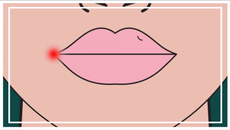 12 cold sore home remedies and treatments
12 cold sore home remedies and treatmentsWhat is a cold sore? Find out everything you need to know, including causes, cold sore stages and natural remedies...
By Debra Waters Published
-
 12 expert-approved sunburn remedies to treat inflammation at home
12 expert-approved sunburn remedies to treat inflammation at homeWant to know how to treat sunburn at home? Check out these expert-approved sunburn remedies...
By Ellie Hutchings Last updated
-
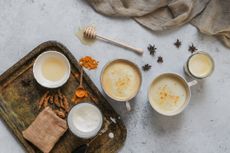 Home remedies for thrush: 9 natural remedies for thrush to try at home
Home remedies for thrush: 9 natural remedies for thrush to try at homeLearn how to treat a yeast infection the natural way with these easy, home remedies for thrush including yogurt, garlic and tea tree oil...
By Debra Waters Published
-
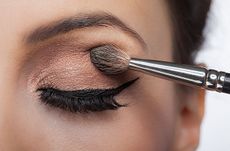 Natural remedies for hair loss: How to treat thinning hair
Natural remedies for hair loss: How to treat thinning hairIf you're suffering from hair loss or thinning hair there are a number of natural remedies you can try - say hello to thicker hair with these solutions!
By Jessica Dady Published
